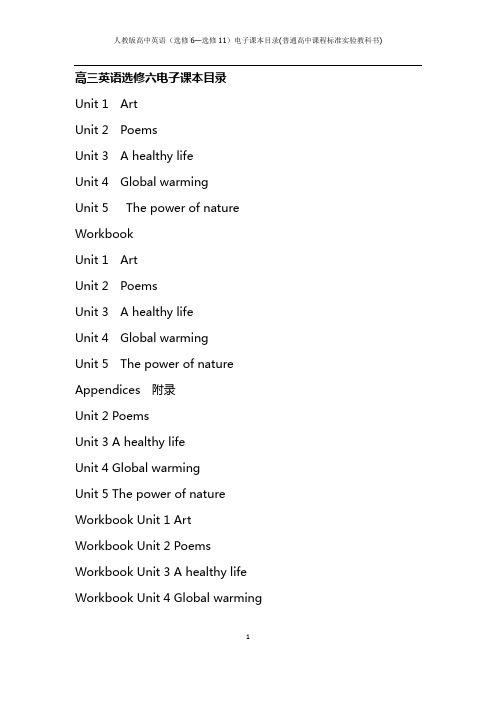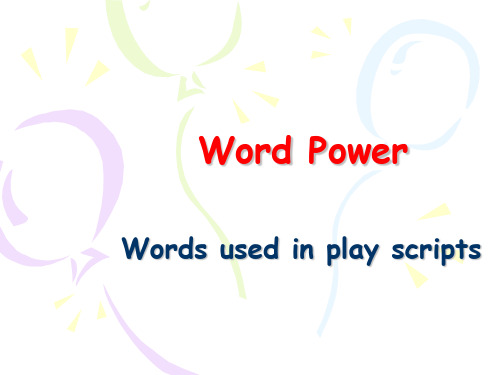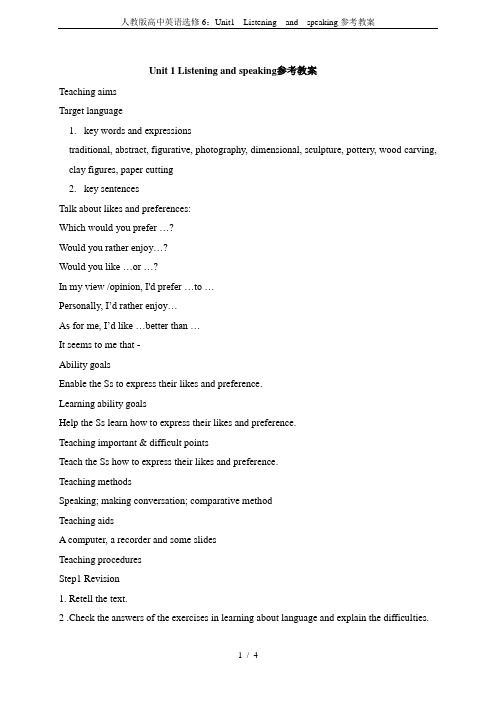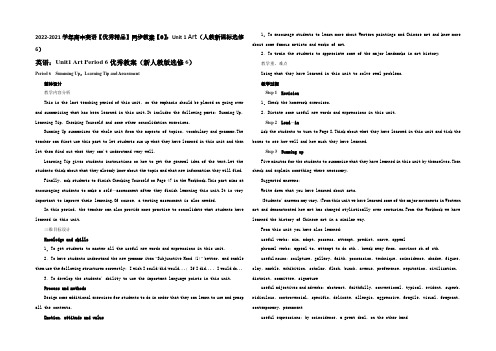高中英语《Unit 1 Word power》教案 新人教版选修6
人教版高中英语(选修6—选修11)电子课本目录(普通高中课程标准实验教科书)

高三英语选修六电子课本目录Unit 1 ArtUnit 2 PoemsUnit 3 A healthy lifeUnit 4 Global warmingUnit 5 The power of nature WorkbookUnit 1 ArtUnit 2 PoemsUnit 3 A healthy lifeUnit 4 Global warmingUnit 5 The power of nature Appendices 附录Unit 2 PoemsUnit 3 A healthy lifeUnit 4 Global warmingUnit 5 The power of nature Workbook Unit 1 ArtWorkbook Unit 2 Poems Workbook Unit 3 A healthy life Workbook Unit 4 Global warmingWorkbook Unit 5 The power of natureAppendices Notes to the textsAppendices GrammarAppendices Words and expressions in each unit Appendices VocabularyIrregular VerbsChanges in international phonetic symbols for English 后记高三英语选修七电子课本目录Unit 1 Living wellUnit 2 RobotsUnit 3 Under the seaUnit 4 SharingUnit 5 Travelling abroadWorkbookUnit 1 Living wellUnit 2 RobotsUnit 3 Under the seaUnit 4 SharingUnit 5 Travelling abroadAppendices 附录高三英语选修八电子课本目录Unit 1 A land of diversityUnit 2 CloningUnit 3 Inventors and inventionsUnit 4 PygmalionUnit 5 Meeting your ancestorsWorkbookUnit 1 A land of diversityUnit 2 CloningUnit 3 Inventors and inventionsUnit 4 PygmalionUnit 5 Meeting your ancestorsAppendicesNotes to the textsGrammarWords and expressions in each unitVocabularyIrregular verbsChanges in international phonetic symbols for English高三英语选修九电子课本目录Unit 1 Breaking recordsUnit 2 Sailing the oceansUnit 3 AustraliaUnit 4 Exploring plantsUnit 5 Inside advertisingWorkbookUnit 1 Breaking recordsUnit 2 Saililing the oceansUnit 3 AustraliaUnit 4 Exploring plantsUnit 5 Inside advertisingAppendicesNotes to the textsGrammarWords and expressions in each unitvocabularyIrregular verbsChanges in international phonetic symbols for English高三英语选修10电子课本目录Unit 1 Nothing Ventured, nothing gainedUnit 2 King LearUnit 3 Fairness for allUnit 4 Learning efficientlyUnit 5 Enjoying novelsWorkbookUnit 1 Nothing ventured, nothing gainedUnit 2 King LearUnit 3 Fairness for allUnit 4 Learning efficientlyUnit 5 Enjoying novelsAppendicesNotes to the textsGrammarWords and expressions in each unitVocabularyIrregular verbsChanges in international phonetic symbols for English高三英语选修11电子课本目录Unit 1 Nex ZealandUnit 2 Detective storiesUnit 3 Finding the correct perspectiveUnit 4 Legends of ancient GreeceUnit 5 Launching your careerWorkbookUnit 1 New ZealandUnit 2 Detective storiesUnit 3 Finding the correct perspectiveUnit 4 Legends of ancient GreeceUnit 5 Launching your careerAppendicesNotes to the textsWords and expressions in each unitVovabularyIrregular verbsChanges in international phonetic symbols for English。
英语:Unit1_Word_power课件(牛津译林版选修6).

4. What will an actor read in a script?
Actor’s lines and stage direcd one-act plays? Very short plays.
Part B: More words
eg: When Mary found out about the holiday, she was all smiles.
Homework:
Recite all the useful expressions related to drama.
1. What do we call the person who acts in a play?
An actor. An actress.
2. What do we call the person who is in charge of a play? A director.
3. What is a script made up of? Acts and scenes.
Word Power
Words used in play scripts
a piece of writing to be performed by actors; a play for theatre, TV, radio, etc.
Let’s enjoy a drama!
AInHreyaWovtuehreayrtooepudiaonenivoyyenord,uriaknacnmotoerawddceailrnubbotasuotat dradpmuraaty?moouIanrfpasnecdorhrtfoa,oomdrlmoa?,iynogu?
what pwraenptartaotaiocntsinshaodulrdambea?made? lead-in:
【全国百强校】安徽省芜湖市第一中学高中英语选修六Unit1 Word power课件 (共46张PPT)

Ⅲ Teaching important and difficult points
Ⅳ Choices of teaching and learning approaches
Contents
Ⅴ Invitation of teaching aids Ⅵ Introduction to teaching procedures Ⅶ Blackboard design Ⅷ My idea of this design
Ⅰ .
Understanding
of the material
&
analysis of my students
Understanding of the material
1 Aiming at enriching Ss' vocabulary
2
The extension of this unit in content
2
Ⅴ. The invitation of teaching aids
The multimedia 1 2 The blackboard
Teaching procedures
1 Greetings and lead-in 2 Presentation 3 More words related to acting 4 Consolidation 5 Summary 6 Assignment
Step 1
Revision
Step 1
Lead-in
1. Have you ever performed on a stage? 2. Do you enjoy your performance? 3. How do the audience like your performance?
Unit 1,M11,Word power教学案

Unit 1, Module 11 Careers and skillsWord power【教学目标】To enlarge students’ vocabulary。
To get students to learn some words and expressions related to different jobs.To improve students’ speaking ability.【教学重难点】Ss are expected to familiarize themselves with the new words and expressions. 【教学方法】Task-based approachesIndividual, pair or group work.【教学工具】The multimedia and the blackboard【教学过程】Step 1. Lead-inPlease say some names of different jobs.Step 2 JobsA: Read “Different types of jobs” on page 6 and find out the names of different types of jobs.1. Practical jobs2. Caring jobs3. Analytical jobs4. Entertainment jobs5. Educational jobs6. Technical and Scientific jobs7. Jobs based on information technology8. Public service jobsStep 3 Part BYang Min selected four jobs from the article and made a table showing what qualities a person needs for each job. Look at the table and find out the different qualities that go with each job.Step 4 Part CYang Min wrote an e-mail to a friend about her thoughts on possible jobs. Complete the e-mail she wrote using the information from Parts A and B.1 ______________________2 ____________________3 _______________________4 ______________________5 ____________________6 _______________________7 ______________________ 8 ____________________Step 5 Part DMatch each job title with its description. Write the correct letter in each blank.1 private investigator ______________2 DJ ______________3 bodyguard ______________4 dolphin keeper ______________5 weather forecast ______________6 art restorer _______________7 bird scarer _______________Step 6 GameWho did the most jobs?Do this game in class in pairs. Let’s see who can say most of the jobs. The one who says most of the jobs wins the game.Example:A: I think I did more jobs than you. I was once a chef.B: I’m afraid you are wrong. I was once a police officer.……【教学后记】。
人教版高中英语选修6:Unit1__Listening__and__speaking参考教案

Unit 1 Listening and speaking参考教案Teaching aimsTarget language1.key words and expressionstraditional, abstract, figurative, photography, dimensional, sculpture, pottery, wood carving, clay figures, paper cutting2.key sentencesTalk about likes and preferences:Which would you prefer …?Would you rather enjoy…?Would you like …or …?In my view /opinion, I'd prefer …to …Personally, I’d rather enjoy…As for me, I’d like …better than …It seems to me that -Ability goalsEnable the Ss to express their likes and preference.Learning ability goalsHelp the Ss learn how to express their likes and preference.Teaching important & difficult pointsTeach the Ss how to express their likes and preference.Teaching methodsSpeaking; making conversation; comparative methodTeaching aidsA computer, a recorder and some slidesTeaching proceduresStep1 Revision1. Retell the text.2 .Check the answers of the exercises in learning about language and explain the difficulties.Step2 Listening① Listening on page 7T: GaoYan, Susan and John are on holiday, and they are discussing which art galleries to visit. Before listening, please answer the following questions.1. Do you think they will agree at the beginning which galleries theywill visit?2. What kind of differences of opinion might they have?First listen to the tape and finish exercise 1 on page 7and then listenagain and answer the three questions. (Slide show)1. Who is the least interested in visiting art galleries?2. Why is Gao Yan interested in visiting the Metropolitan Museum?3. Why doesn’t Susan want to go to the Museum of Modern Art?Keys: 1.Susan2. He wants to see the exhibition of Chinese art.3. It is big, crowded and too expensive.② Listening on p41T: Now let’s turn to Listening practice on p41; before listening, answerthe questions on the screen.1. Which object do you think would be the most expensive?2. If you could have one of these objects as a present, which would you choose? Why?3. If you had to buy a present for someone who was an art teacher,which present do you think he would like best?(At first, ask the Ss to listen to the tape for the first time and numberthe presents 1-4. Next, listen to it again to fill in the form.) After that,please listen to the tape again and answer the following questions.1. Why did they decide not to get the vase for Mr. Huang?2. Why did Steve Lee wish they had talked to Mrs. Huang before they went shopping?3. Which present do you think the students will get? Give your reason.Keys: 1. It was too expensive.2. Mrs. Huang would probably have known what to get for Mr. Huang.3. I think they will probably get the wall hanging because the otherssee m to respect Wang Pei’s opinion. Also, they know Mr. Huang likesthat type of wall hanging.③Listening practice on page 44.Before listening, ask the Ss to look at the paintings and discuss in what period of Chinese history they were created.Slide showListen to the tape for three times and fill in the chart.Step3 SpeakingT: So far, we have learned some know ledge about the art. Today let’s talk about how to express likes and preferences. Do you know how to express likes and preferences? (Show the following on the screen).Which would you prefer …?Would you rather enjoy…?Would you like …or …?In my view /opi nion, I'd prefer …to …Personally, I’d rather enjoy…As for me, I’d like …better than …It seems to me that -T: Look at the talking topics shown on the screen and discuss with your partner and make up a dialogue. (Show the following on the screen)Talking Topics1. Who are your favorite artists, both from China and from othercountries? Give reasons for your preferences.2.What kind of art do your prefer: modern or traditional, abstract or figurative(修饰丰富的),painting or photography, two-dimensional(两维的)(e.g. painting, photography) or three-dimensional (e.g. sculpture (雕塑), pottery)?3. What kind of Chinese art do you like best? In your discussion include examples of folk art(e.g. New Year Graphics, wood carving, papercutting, and clay figures.)4.What kind of Western art do you like best? In your discussion include examples of the Middle Ages, the Renaissance, Impressionism andModern art.Step4 HomeworkWrite a passage to introduce the galleries you have ever been to.。
高中英语 Unit 1《Getting along with others》Word power文字

Unit 1 Getting along with othersWords and expressions1. get along①get along/ on with sb. 和睦相处She works hard and is easy to get along with.They should get along well together because they have much in mon.他们在一起应该处得不错,因为他们有许多共同点。
(2008某某卷) 9. I used to quarrel a lot with my parents, but now we ______ fine.A. look outB. stay upC. carry onD. get along②get along / on (with sth.) 进展,进行How are you getting along with your English? 你的英语学得怎么样?How is your son getting along in school? 你的儿子在学校表现怎么样?The business is getting along very well. 生意经营得很不错。
They said they could get along without our help.他们说没有我们的帮助他们也能进行下去。
〔MET93〕Readers can ____ quite well without knowing the exact meaning of each word.A. get overB. get inC. get alongD. get through〔2006某某〕28.—How are you managing to do your work without an assistant?—Well, I____________ somehow. 〔总算〕A. get alongB. e onC. watch outD. set off2. betray vt.①背叛,出卖〔同〕desert, abandonbetray one’s country 叛国betray one’s f riends 背叛朋友He betrayed me. 他背叛了我。
2020-2021学年高中英语同步教案:Unit 1 Art(人教新课标选修6)

2022-2021学年高中英语同步教案:Unit 1 Art (人教新课标选修6)Book Six Unit 1 ArtⅠ重点词汇1. faith n.信仰;信任;信念have faith in sb./sth. 对某人/某事有信念 lose faith in 不再信任,对…失去信念faithful adj.忠实的 be faithful to sb. [sth.] 忠实于某人[某事]faithfully adv.忠实地1) Having faith in the masses is the requirement by government.信任群众是对政府的要求。
__________________________.2) Under no circumstances shall we lose faith in the future...在任何状况下,我们都不该对将来失去信念。
____________. 3) The newly-elected monitor declared that he would carry out his duty_ faithfully _.4)The lovers promised to be ____ faithful forever. 2. consequently adv .因此,所以= therefore=as a result consequent adj . 作为结果的,随之发生的 consequence n .(常指不利的)影响,后果,常有以下用法: as a consequence 因此,结果= in consequence=as a result as a consequence of 由于…的结果 = in consequence of = as a result of take/suffer/face the consequences 担当后果 1)He broke the law and now he must take/suffer/ face the consequences of his actions _____(担当自己的行为带来的后果). 2)The governor was found guilty , and consequently lost his position/ and lost his position in consequence/ and as a consequence lost his position _____(因而失去了职位). 3) He got a marvelous ﹙非凡的﹚achievement in consequence of his great effort ___ (由于他付出的努力) . 3. aim n. 目标;目的;瞄准vi.&vt.瞄准(向某方向)努力 (1) take aim at 向……瞄准 achieve one’s aim 达到目的 miss one ’s aim 打不中目标,达不到目的 without aim 漫无目的地 with the aim of 以期……,意在…… (2)aim at sth. 向…瞄准;旨在 aim for sth 力求达到 aim at doing sth./ aim to do sth.意欲、企图做某事, 旨在做某事 be aimed at 目的是,旨在(主语一般是物) (3)aimless adj .无目的的 1) What is your aim in life? 你生活的目的是什么? 2) He aimed the gun at the enemy officer .他用枪瞄准了敌军官。
2020-2021学年高中英语【优秀精品】同步教案【6】:Unit 1 Art(人教新课标选修6)

2022-2021学年高中英语【优秀精品】同步教案【6】:Unit 1 Art(人教新课标选修6)英语:Unit1 Art Period 6优秀教案(新人教版选修6)Period 6Summing Up,Learning Tip and Assessment整体设计教学内容分析This is the last teaching period of this unit,so the emphasis should be placed on going over and summarizing what has been learned in this unit.It includes the following parts:Summing Up,Learning Tip,Checking Yourself and some other consolidation exercises.Summing Up summarizes the whole unit from the aspects of topics,vocabulary and grammar.The teacher can first use this part to let students sum up what they have learned in this unit and then let them find out what they can't understand very well.Learning Tip gives students instructions on how to get the general idea of the text.Let the students think about what they already know about the topic and what new information they will find.Finally,ask students to finish Checking Yourself on Page 47 in the Workbook.This part aims at encouraging students to make a self-assessment after they finish learning this unit.It is very important to improve their learning.Of course,a testing assessment is also needed.In this period,the teacher can also provide more practice to consolidate what students have learned in this unit.三维目标设计Knowledge and skills1.To get students to master all the useful new words and expressions in this unit.2.To have students understand the new grammar item “Subjunctive Mood (1)” better,and enable them use the following structures correctly:I wish I could/did/would...;If I did...,I would do...3.To develop the students' ability to use the important language points in this unit.Process and methodsDesign some additional exercises for students to do in order that they can learn to use and grasp all the contents.Emotion,attitude and value1.To encourage students to learn more about Western paintings and Chinese art and know more about some famous artists and works of art.2.To train the students to appreciate some of the major landmarks in art history.教学重、难点Using what they have learned in this unit to solve real problems.教学过程Step 1Revision1.Check the homework exercises.2.Dictate some useful new words and expressions in this unit.Step 2Lead-inAsk the students to turn to Page 8.Think about what they have learned in this unit and tick the boxes to see how well and how much they have learned.Step 3Summing upFive minutes for the students to summarize what they have learned in this unit by themselves.Then check and explain something where necessary.Suggested answers:Write down what you have learned about arts.(Students' answers may vary.)From this unit we have learned some of the major movements in Western art and demonstrated how art has changed stylistically over centuries.From the Workbook we have learned the history of Chinese art in a similar way.From this unit you have also learned:useful verbs:aim,adopt,possess,attempt,predict,carve,appealphrasal verbs:appeal to,attempt to do sth.,break away from,convince sb.of sth.useful nouns:sculpture,gallery,faith,possession,technique,coincidence,shadow,figure,clay,marble,exhibition,scholar,flesh,bunch,avenue,preference,reputation,civilization,district,committee,signatureuseful adjectives and adverbs:abstract,faithfully,conventional,typical,evident,superb,ridiculous,controversial,specific,delicate,allergic,aggressive,fragile,visual,fragrant,contemporary,permanentuseful expressions:by coincidence,a great deal,on the other hand。
- 1、下载文档前请自行甄别文档内容的完整性,平台不提供额外的编辑、内容补充、找答案等附加服务。
- 2、"仅部分预览"的文档,不可在线预览部分如存在完整性等问题,可反馈申请退款(可完整预览的文档不适用该条件!)。
- 3、如文档侵犯您的权益,请联系客服反馈,我们会尽快为您处理(人工客服工作时间:9:00-18:30)。
教学目标
1)To understand the text better
2)To master some useful words and expressions
重点
1.To understand the text better
Practice
1.On hearing the gunshot, the birds flew in all d______.
2. Do you think your w___ are strong enough to fly by yourself?
3. People living in the countryside can enjoy wonderful natural s_____.
5.know the props that are going to be used before going on stage
6. calm down and be confident when on stage
Step 5 Idioms about smiling & laughing
to laugh one’s head off: to laugh very hard
stage direction (舞台说明)
Act (幕)
Scene (场)
one-act play (独幕剧)
Step2 Word play
Match the words with the explanation
A: areas to the right and left of stage which the audience can’t see.
8.the area at either side of the stage that can not be seen by the audience
9.the clothes worn by actors in a play, or worn by somebody to make them look like something else.
lines & stage direction Zhang Yimou
张艺谋
A famous director
(paper in hand)
a person in charge of the whole performance
Cast (全体演员)
Director (导演)
Lines (台词)
Script (剧本)
B: screen that can be raised or lowered at the front of a stage.
C: platform of place on which plays are performed.
D: things used on a theatre stage to represent the place of action.
1.What do we call the person who acts in a play?
2.What do we call the person who is in charge of a play?
3.What is a script made up of?
4. What will an actor read in a script?
难点
1.To master some useful words and expressions
教法及教具
Talking, Practicing
教
学
过
程
教学内容
个案调整
教师主导活动
学生主体
活动
Step 1 Word study
Read the passage on Page 6, Part A. Pay attention to the words in blue, guessing the meanings of them.
How to be a good actor ?
1. listen to the director
2. learn lines by heart
3. find out when the character he or she is playing on stage
4.Байду номын сангаасdress in his or her costume and wait in the wings in time
1. To kill or not to kill, that is the question.
Do you know the names of the cast and the line in these
scenes(场景)?
the words that
the actors say.
2. Uncle Li is very angry; the consequence is very serious.
E: special style of dress for a particular activity.
1.scenery_______ 2.stage__________
3.curtains_______ 4.costume________
5.wings _______
Step 3 Word competition
4. Please read the s___ of the play first and try to keep the lines in mind.
5. Act1, S_____2 of ‘Hamlet’ is exciting.
Step 4 Discussion
Read part C, and discuss how to be a good actor.
5. What kind of play is called one-act plays?
6.a part of a play in which the action happens in one place
7.a small object used by actors during the performance of a play or film
